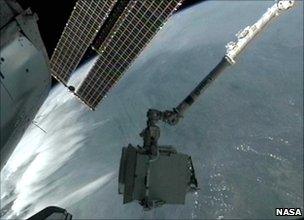Alpha Magnetic Spectrometer bolted to space station
- Published

AMS was put in place in hand-over manoeuvre by the robotic arms of the shuttle and station
A giant particle detector has been slotted into position on the back of the International Space Station (ISS).
The 7-tonne Alpha Magnetic Spectrometer (AMS) will sift cosmic rays over the next decade, looking for clues to the origin and make-up of the Universe.
With an estimated development cost of $2bn, the detector is the single most expensive experiment at the ISS.
AMS was brought up to the station by the US shuttle Endeavour, which is on its final mission before retirement.
Astronauts Roberto Vittori and Andrew Feustel used the orbiter's robotic arm to lift AMS out of its payload bay, before handing off the machine to the station arm operated by Greg Johnson and Greg Chamitoff. The latter pair then swung the device on to an attach point on the platform's starboard truss, or backbone.
Confirmation that all latches were secure came at 0946 GMT as the ISS was travelling over the border between Pakistan and India.
The machine should be streaming data down to a temporary operations centre in Houston, Texas, within hours.
AMS's perch is slightly tilted to give it a view of the sky that is unobstructed by the station's big solar wings.
No-one is expecting dramatic announcements immediately, but the scientists working on the detector project say it could eventually make profound discoveries.
The device will undertake a comprehensive survey of cosmic rays - the blizzard of high-energy particles (mostly protons and helium nuclei) that are accelerated in Earth's direction from exploded stars, black holes and who knows what other exotic corners of the cosmos. AMS will:
look for clues to the nature of "dark matter", the material that shapes galaxies and makes up most of the mass of the Universe
hunt for complex antimatter, which might hint at the existence of stars and planets made from material that is a mirror of the matter in normal stars and planets
try to catch strangelets, or strange matter, which is built from a slightly different mix of sub-atomic particles to that of normal matter
characterise the space radiation environment so that the dangers for astronauts and satellites of being in space is fully comprehended
Endeavour arrived at the station on Wednesday after a two-day journey from Earth.
The ship is commanded by Mark Kelly, who just a few months ago looked like he might not even make the trip because of a gun assault on his wife, the Arizona congresswoman Gabrielle Giffords. Doctors say she is making good progress as she recovers from a bullet injury to the brain - sufficient progress to allow Kelly to fulfil his astronaut duties.
Ms Giffords underwent surgery on Wednesday to put a piece of plastic over a hole in her skull.
"Obviously this has been a long road for us since January 8th," Commander Kelly said from orbit just after AMS installation. "Her having surgery yesterday was not planned all along, but she was ready and the doctors wanted to do it then; and it didn't make sense to wait a couple of weeks until I got back. I've been thinking a little bit about that, but it's pretty common surgery and it went very well."
The US Navy captain was the first through the hatch after Wednesday's docking. After the customary greetings from the station's residents, which included the ringing of a ship's bell to welcome aboard the visitors, the Endeavour shuttle crew then immediately set about their tasks.
The key one for the day was the transfer of a tray of critical spare parts for the platform. These spares comprised gas tanks, electrical units, and computer and communications equipment.
Endeavour's crew will do four spacewalks during their stay to carry out routine maintenance on the exterior of the ISS - the last spacewalks ever to be conducted by a shuttle crew.
The ship is due back on Earth on 1 June. Completion of its mission will leave only Atlantis still to fly before the US space agency (Nasa) stands down its orbiter programme for good. Atlantis should launch its cargo delivery mission to the station sometime in July.
Nasa engineers are assessing some damage to heat-resistant tiles on Endeavour's belly, but the defects are not thought to be serious.
"We've seen this kind of damage before, and it's not too much of a concern for us," said Commander Kelly.
- Published27 April 2011
- Published16 May 2011
- Published16 May 2011
- Published18 May 2011